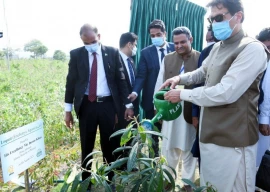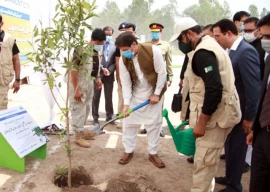
Mangroves around the world are considered nature’s first line of defence; protecting coastal ecosystems and preventing soil erosion. Owing to this, governments everywhere have been adamant in taking concrete steps to safeguard these unique coastal habitats.
The Sindh Forest Department had also launched two programmes in a similar vein. These included Conservation, Development, and Management of Indus Delta Mangroves (to check sea intrusion) at the cost of Rs631,670 million, and the Possible Role of Mangroves (in curbing sea intrusion in Indus Delta) for Rs759,605 million.
However, a recent audit into these programme has landed the government in grips of controversy; highlighting several loopholes in the implementation of the provincial scheme.
The audit, conducted at the behest of Sindh’s director general audit and released by the auditor general of Pakistan, was recently presented its report before the Sindh Assembly. Per the report’s major findings, it was revealed that both projects, despite their hefty cost, had failed to achieve their primary objectives in accordance with the timeline stated in their PC-I.
In addition to that, the study also pointed out that various project-related records, such as exaggerated cost of items, over-estimated cost of works, non-development of permanent mechanism of monitoring and evaluation, and impact assessment procedure, were made internally rather than by an external agency or expert.
Furthermore, it was also observed that no efforts were undertaken by the Forest Department, to collaborate with other departments, to cater to challenges of seawater intrusion and depletion of rainwater levels. Neither were any proactive measures taken to tackle land degradation, which is occurring at an unprecedented rate due to seawater intrusion.
Read More: Karachi’s forest in peril
In response to this, the audit mainly recommended steps for proper monitoring and evaluation mechanism in the Forest Department; with the inclusion of stakeholders, prominent environmental experts, and up-gradation of GIS Laboratory in accordance with PC-I provisions and international standards.
According to the report, four different organisations control the Indus Delta mangroves separately. The area under the control of the Sindh Forest Department is 280,470 hectares. Similarly, 64,400 hectares of the area is under Port Qasim Authority, 2000 hectares is under Karachi Port Trust, and 260,000 hectares is under the Sindh Board of Revenue.
The area under the control of the Sindh Forest Department and Port Qasim Authority is declared as a protected forest. However, the area under the control of the Board of Revenue is classified as Government wasteland.
The audit report also highlighted that the project called Conservation, Development and Management of Indus Delta Mangroves, had aimed to protect coastal communities and their agricultural lands, livestock, and other infrastructure from coastal threats, in its objective. It further promised to alleviate poverty by providing employment and income generation opportunities to coastal dwellers and starting eco-tourism in the coastal belt.
However, it was found in the environmental audit of the financial years 2011-12 and 2016-17 that Rs5,848 million were spent under community mobilisation and incentive-based programmes without details of activities. Moreover, no proactive efforts were taken for rehabilitation of the degraded land and protection of mangroves. “No measures were undertaken in respect of mangroves’ contribution towards a generation of habitat and eco-tourism,” the report added.
Addressing on-ground realities, on the other hand, Syed Gulab Shah, a grower from Keti Bundar, said that coastal erosion has eroded thousands of acres of land in the area in the past several years. “The destruction of the ecosystem due to sea intrusion has forced local communities to migrate to Karachi and other towns of the province. The coastal erosion has also destroyed the agriculture of the area. My family was cultivating 400 acres of fertile land, which is now reduced to 100 acres due to sea erosion,” the farmer lamented.
When probed regarding the audit’s claims, Sind Forest Department Secretary Badar Jamil Mandhro said that he was not in the department when both the projects were being implemented and hence cannot comment on the situation. “However, I will see into the matter and ascertain reasons for not responding to audit queries. It is an obligation of every department to respond to audit queries accordingly,” he maintained while speaking to The Express Tribune.
Published in The Express Tribune, January 12th, 2022.





















COMMENTS
Comments are moderated and generally will be posted if they are on-topic and not abusive.
For more information, please see our Comments FAQ